Top 15 AI Tools for HR Teams to Streamline Operations
.avif)
HR departments are under constant pressure to improve efficiency, enhance employee experiences, and maintain high levels of productivity. With growing demands and often limited resources, teams are turning to AI tools to automate repetitive tasks, streamline workflows, and make smarter, data-driven decisions. By integrating the right solutions, HR leaders can reduce manual work, improve compliance, and free up time to focus on strategic initiatives that drive business growth.
In this article, we will explore how AI tools for HR can help teams improve efficiency, highlighting Cercli's global HR system as a key solution.
What is AI in HR?

AI in human resources refers to the application of artificial intelligence technologies like machine learning, natural language processing, and predictive analytics to streamline HR functions. It allows HR teams to automate repetitive processes, personalise employee experiences, and extract insights from data to support better workforce decisions.
How AI Supports HR Teams. AI is helping HR departments transition from administrative support roles to strategic business partners. Key benefits include:
- Automating repetitive tasks like CV screening, payroll processing, and answering employee queries
- Enhancing recruitment through smarter candidate matching and bias detection
- Improving employee retention with personalised learning and well-being tracking
- Generating actionable insights from HR data for better workforce planning
How Does AI Work in HR?
AI in HR uses various technologies capable of analysing large volumes of data in real-time, recognising patterns, generating content and simulating human-like interactions.
These capabilities are transforming how HR departments operate, enabling them to transition from primarily administrative functions to more strategic roles within organisations.
What Are the Benefits of AI in HR?
Today’s HR leaders face multiple challenges:
- Evolving employee expectations
- A global labour shortage
- A growing skills gap
As AI rapidly changes the business landscape, HR departments are poised to play a significant role in managing change.
According to research from the IBM Institute for Business Value, only 20% of executives say HR owns the future of work strategy at their organisation. This raises the question: If HR doesn’t own the future of work, who will? The technology, with its promise to reshape the business landscape, is as much an HR initiative as an IT concern.
What Is the Future of AI in HR?
In the coming years, the use of AI will impact HR departments in two significant ways:
- By streamlining HR operations and utilising workplace data to improve the talent planning and management process.
- AI will require HR departments to foster a culture that is change-minded and embraces new ways of working.
This shift requires some realignment, but the potential benefits are significant.
Related Reading
- Best Employer of Record Companies
- Employer of Record vs Staffing Agency
- Employer of Record Payrolling
- Challenges of Managing a Global Workforce
- Consequences of Payroll Errors
Top Applications of AI in HR
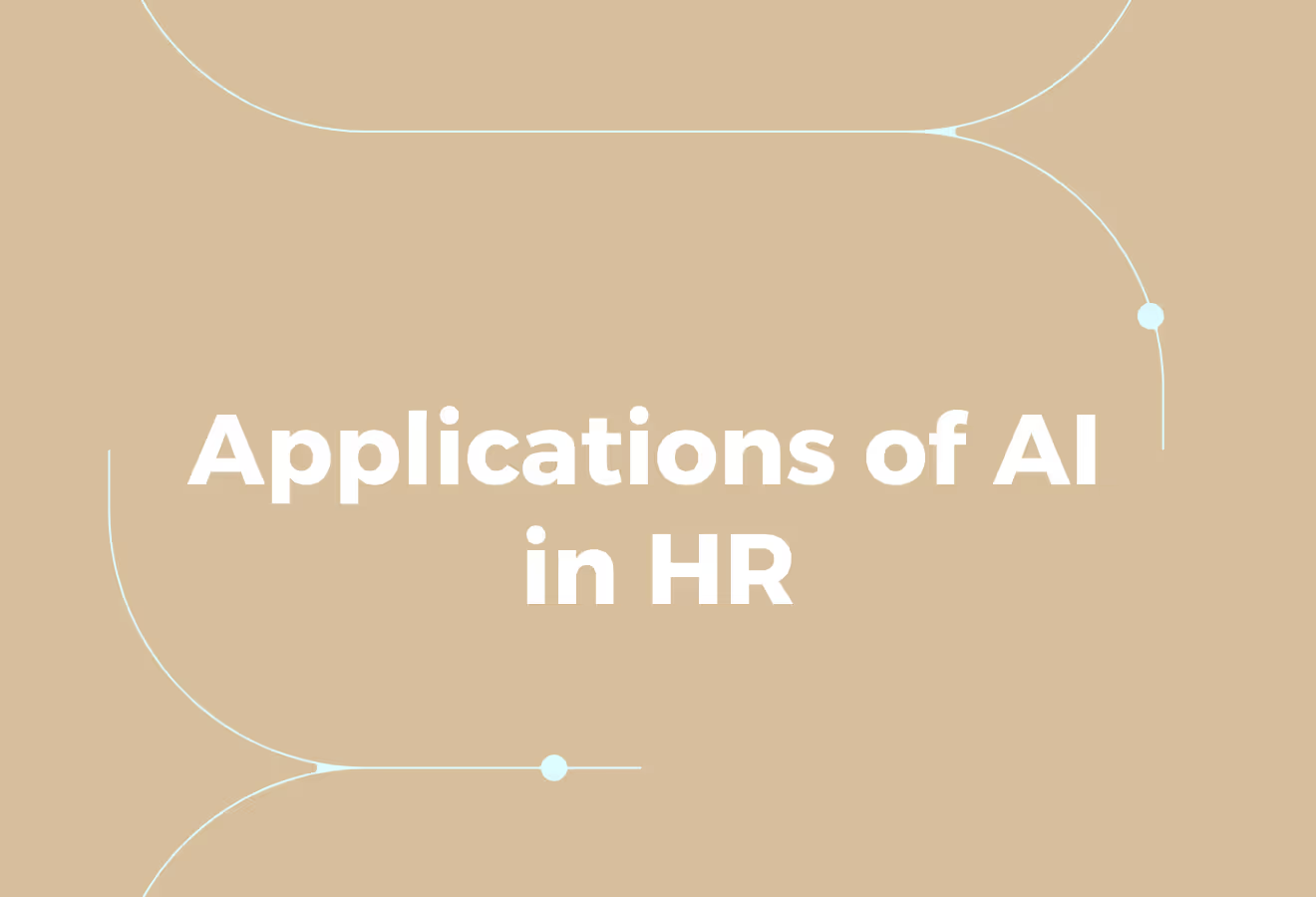
Recruitment and Talent Acquisition: AI's Role in Finding Your Next Hire
Artificial intelligence can streamline the recruitment process to help you find the right candidate faster. AI-integrated tools can help with every stage of recruitment, from sourcing to screening and onboarding.
These tools can help you find and attract qualified candidates while reducing the burden on HR teams.
Administrative HR: AI Tools Can Help with Mundane HR Tasks
Administrative HR tasks can be tedious and time-consuming. With AI support, you can keep your internal operations running smoothly, allowing your HR team to focus on more strategic initiatives.
Employee Management: AI Improves Training and Well-Being
AI can help improve employee management processes in several ways. AI helps customise training and development programmes by identifying individual needs and assessing personal performance data.
With this information, AI can create tailored upskilling programs that enhance internal mobility and offer employees better development opportunities. AI can also assist with monitoring employee well-being. AI tools can analyze data to pinpoint employees who may be experiencing excessive workloads or other issues, allowing HR to intervene and help before a crisis occurs.
Insights and Results: AI Boosts Metrics and Data Management
AI can help improve nearly every aspect of recruitment and employee performance, from measuring results to optimising processes. Modern AI solutions create opportunities for better data handling and analysis.
Leveraging data effectively and improving recruitment and HR metrics with AI can help boost efficiency and enhance overall business performance.
Top 15 AI Tools for HR Teams to Streamline Operations
HR teams are under pressure to improve efficiency, compliance, and employee experience, often with limited resources. Artificial Intelligence (AI) is transforming how HR operates by automating repetitive tasks, providing predictive insights, and enabling smarter decision-making. Below are 15 of the best AI-powered HR tools making a difference today.
1. Cercli: AI-Driven Global HR Platform
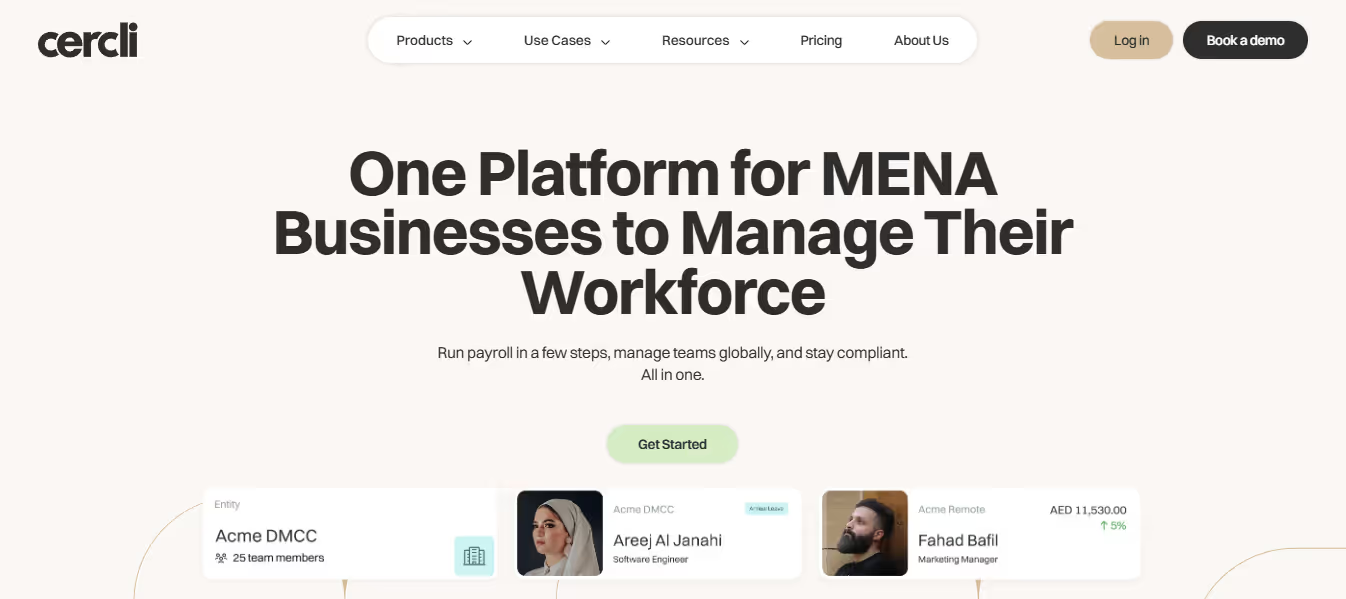
Cercli uses AI to speed up and improve HR operations across regions. Unlike traditional migrations that take months, Cercli leverages AI to migrate companies from legacy systems in as little as 48 hours while ensuring data accuracy and consistency.
- Expense reimbursement: Employees simply upload a receipt in any format or language, and AI extracts, validates, and processes the claim automatically.
- Payroll accuracy: AI checks payroll and compliance modules in real time to prevent errors.
- Global compliance: The system uses AI to handle WPS, GOSI, DEWS, and contract generation with speed and precision.
This makes Cercli a strong choice for companies scaling quickly and managing cross-border teams.
2. IBM Watson: Predictive HR Analytics
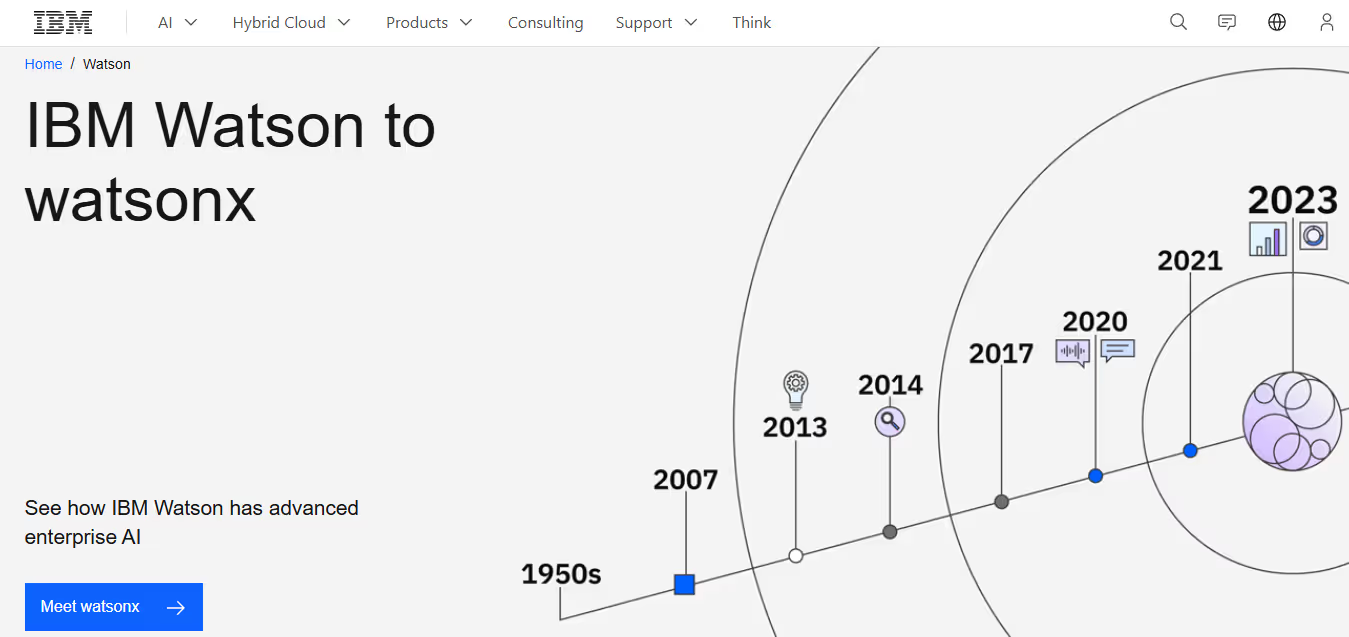
IBM Watson’s AI tools provide HR with data-driven recruitment and workforce planning. It automatically screens CVs, identifies suitable candidates, and highlights performance trends. Its predictive models flag employees at risk of leaving, giving HR a chance to act proactively.
3. ChatGPT: Conversational AI for HR
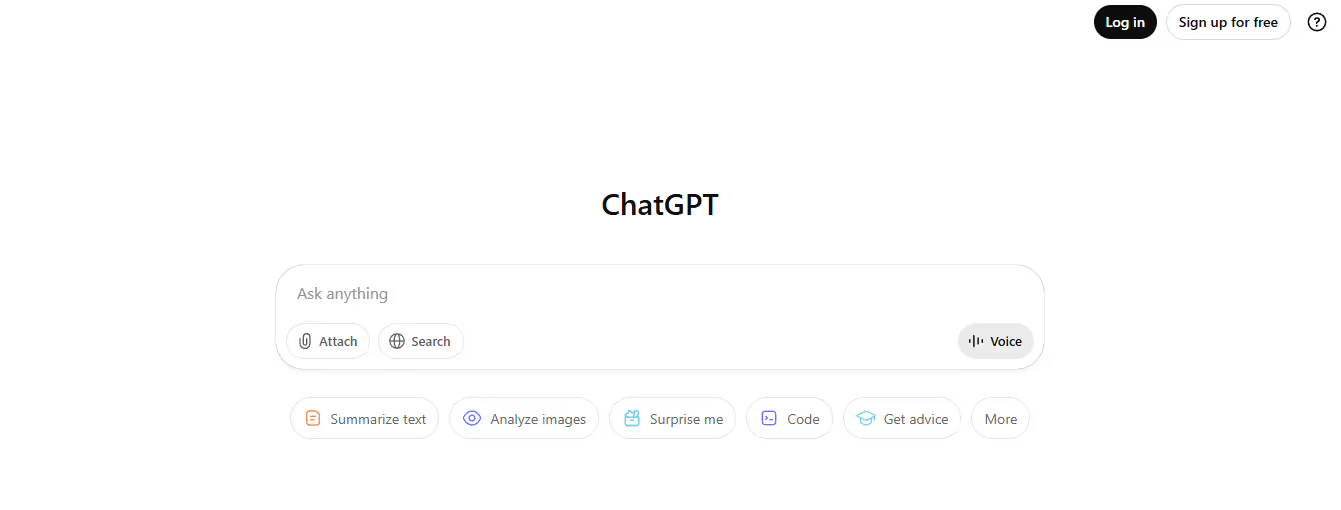
ChatGPT (including its free version) can handle a wide range of HR queries and communications. It automates responses to FAQs about leave, policies, and onboarding, reducing HR’s workload.
- Onboarding: Guides new hires by answering policy and benefits questions in natural language.
- Recruitment: Assists in drafting job descriptions, pre-screening questions, and communication templates.
- Employee support: Provides 24/7 availability for common employee needs.
By taking on repetitive communication, ChatGPT frees HR professionals to focus on human-centric tasks.
4. HireVue: AI Video Interviewing
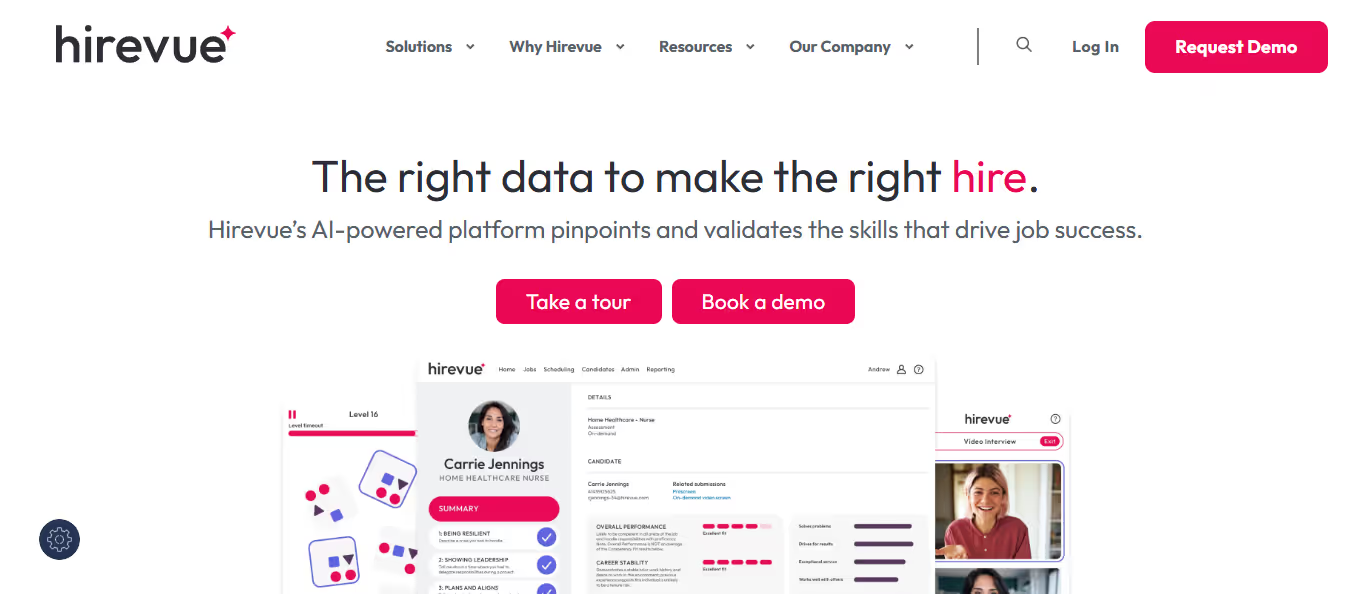
HireVue applies AI to video interviews, analyzing candidate speech, tone, and behavioral cues. This helps HR teams quickly identify high-potential candidates and reduce bias in initial screenings.
5. Eightfold.ai: AI-Powered Talent Matching
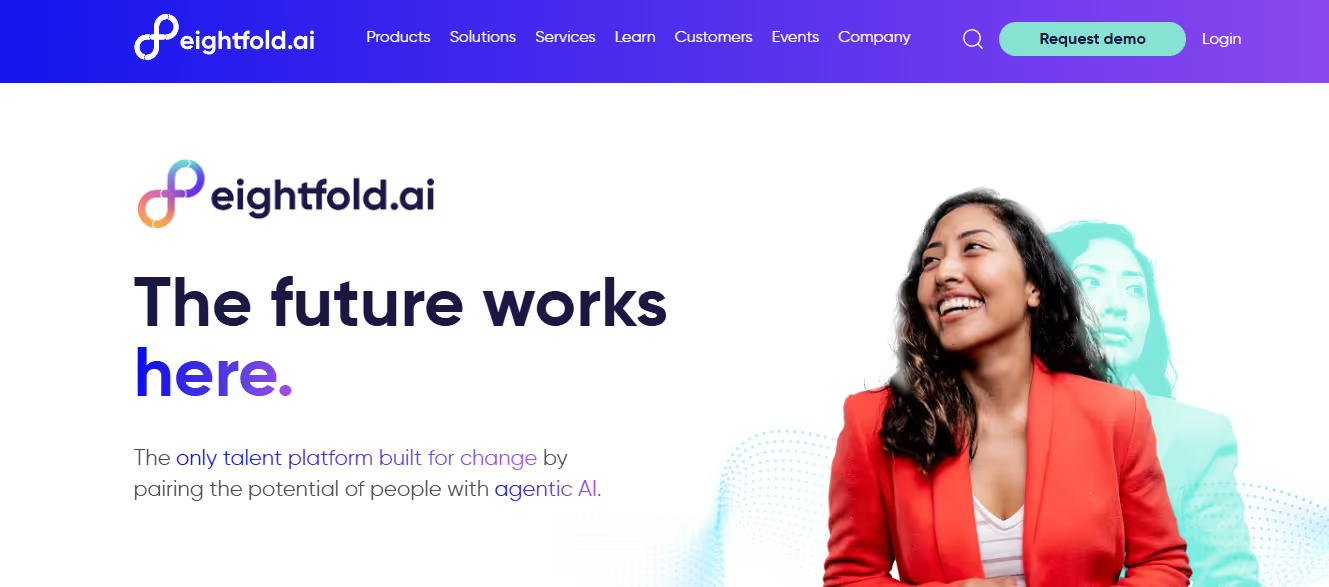
Eightfold uses deep learning to match candidates to jobs based on skills, not just resumes. It predicts career trajectories, identifies internal talent for mobility, and recommends upskilling opportunities.
6. Visier: AI-Driven Workforce Analytics
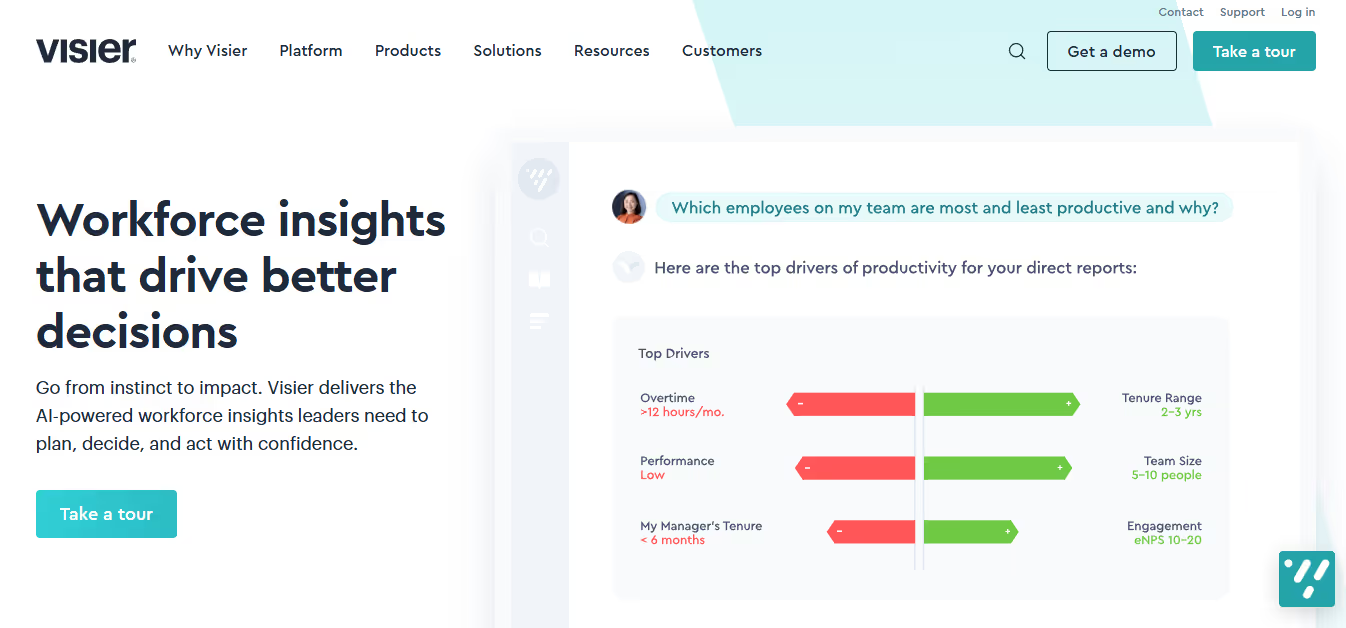
Visier leverages AI to connect HR data with business outcomes. It predicts turnover, analyzes engagement, and provides dashboards that help HR leaders make informed, forward-looking decisions.
7. Pymetrics: Bias-Reduction in Hiring

Pymetrics applies neuroscience-based AI assessments to evaluate candidates on cognitive and emotional traits. Its behavior-first model helps reduce hiring bias and ensure better role fit.
8. Headspace, Unmind, Lyra: AI for Employee Wellbeing
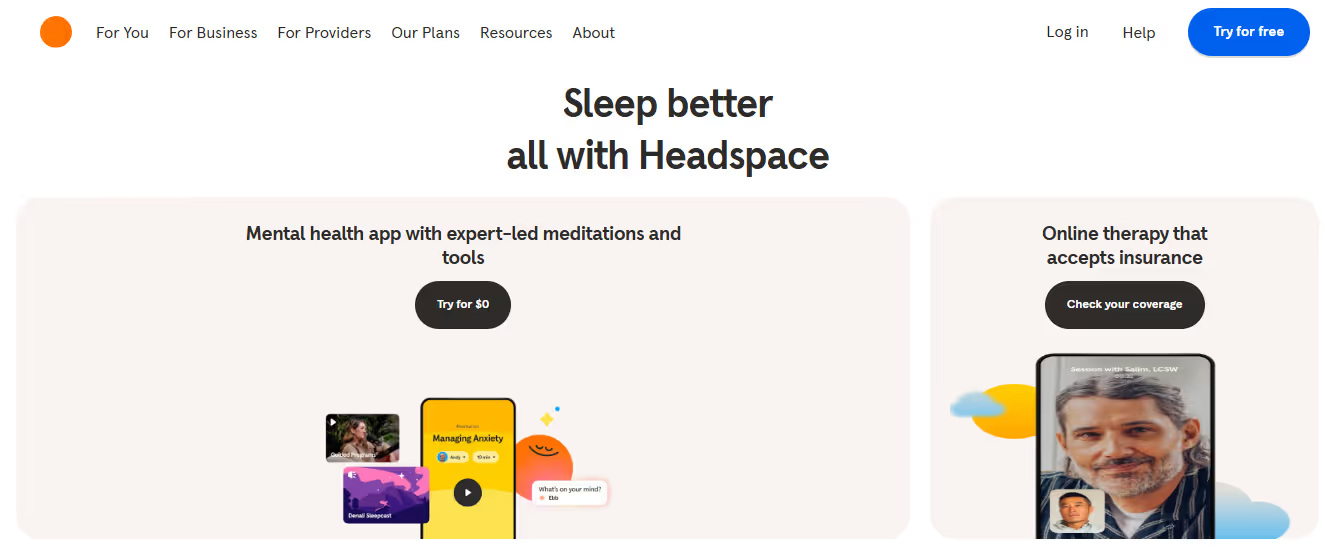
AI isn’t just for hiring; it’s also improving employee wellbeing.
- Headspace: Personalizes guided meditation and stress-reduction routines with AI-driven recommendations.
- Unmind: Uses AI to track employee wellbeing metrics and suggest tailored mental health resources.
- Lyra Health: Leverages AI to match employees with therapists and support based on specific needs.
These tools improve retention by proactively supporting mental health.
9. HiredScore: AI Candidate Ranking

HiredScore integrates with applicant tracking systems and applies machine learning to rank candidates automatically. This accelerates recruitment, reduces bias, and ensures top applicants are prioritized.
10. Skillate: Skills-Based AI Screening
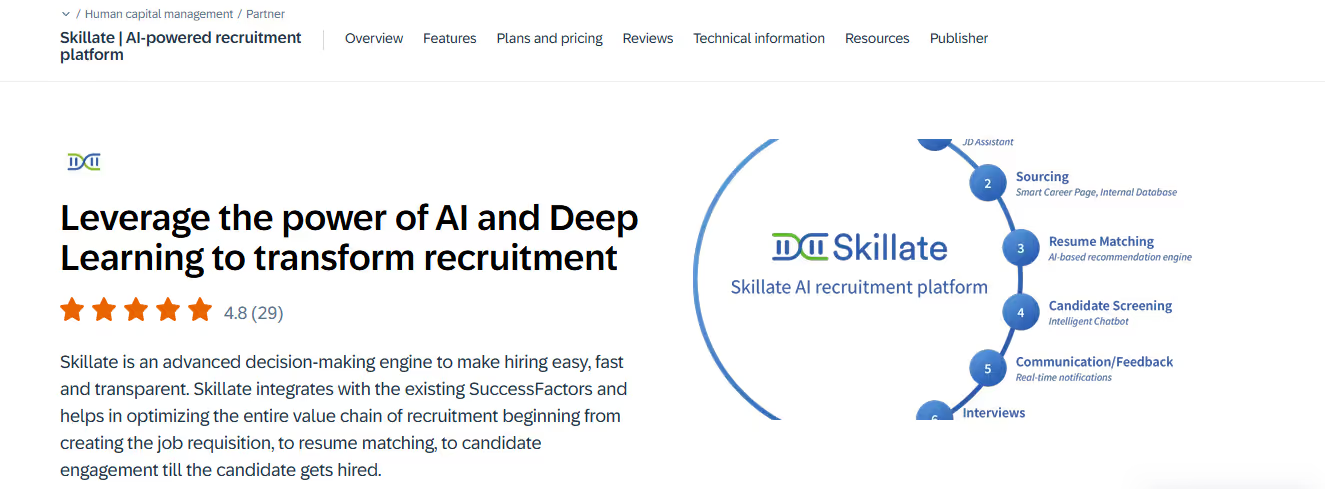
Skillate focuses on evaluating capabilities rather than backgrounds. Its AI engine analyzes resumes for core skills and predicts candidate potential, uncovering hidden talent that traditional methods might overlook.
11. Lattice: AI-Powered Performance Management
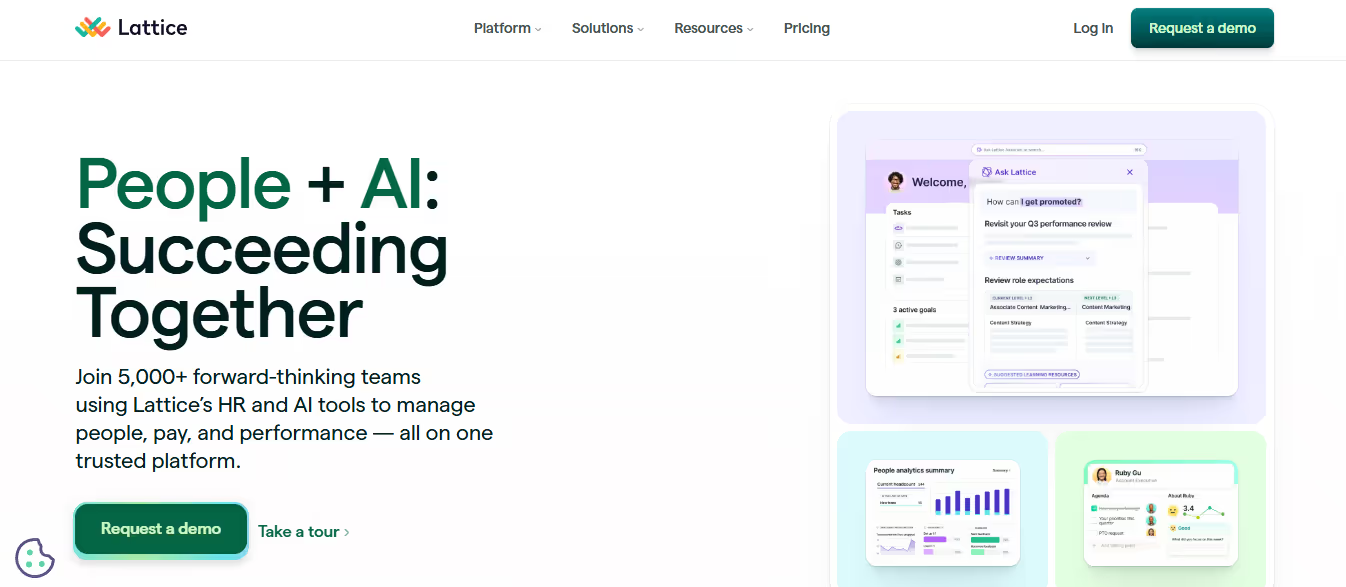
Lattice combines performance reviews, engagement surveys, and employee development into one platform. Its AI tools analyze feedback patterns, highlight top performers, and recommend career development actions for managers.
12. Manatal: AI-Powered Recruitment CRM
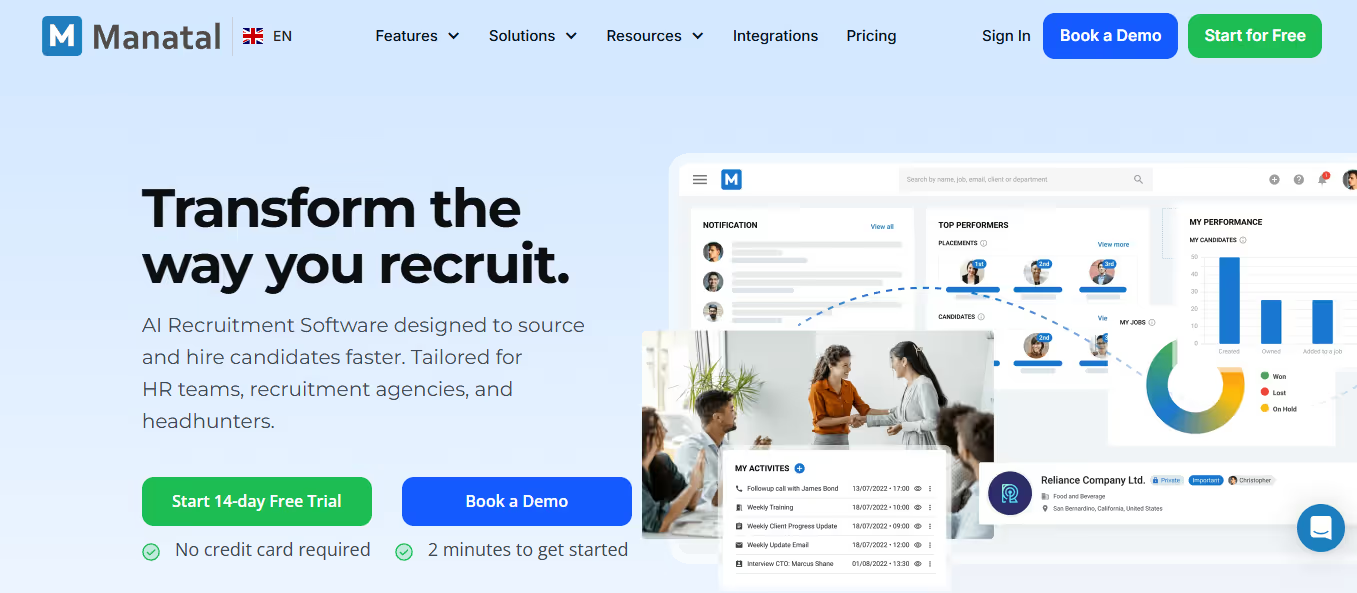
Manatal uses AI to enrich candidate profiles with publicly available data, automatically rank applicants, and streamline collaboration among hiring teams. It’s especially effective for companies managing high-volume hiring.
13. hireEZ: AI-Powered Talent Sourcing

hireEZ uses AI to scan multiple data sources to discover passive candidates, then automates outreach at scale. Its predictive analytics help HR teams prioritize candidates most likely to engage.
14. Leena AI: HR Virtual Assistant
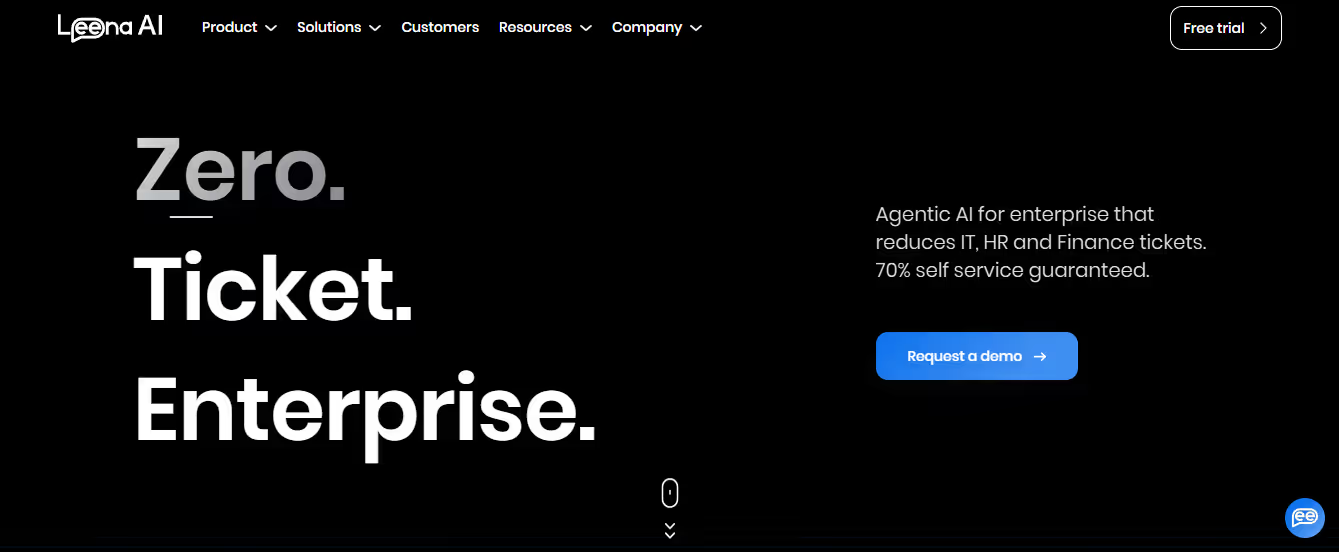
Leena AI functions as an AI-powered HR helpdesk. It automates leave requests, policy questions, and onboarding support. By integrating across HR systems, it ensures fast, consistent answers and reduces manual workload.
15. Findem: Attribute-Based Talent Search
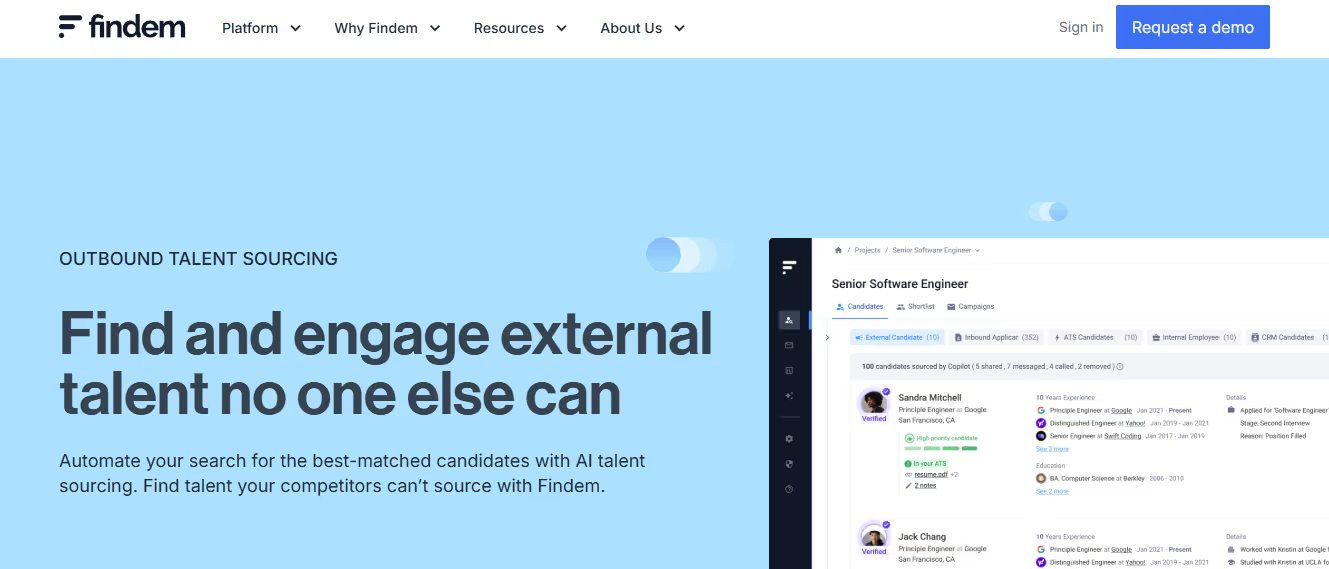
Findem’s AI surfaces candidates by analyzing both technical and non-technical attributes, such as leadership style or cultural fit. It helps HR move beyond keyword searches to find candidates that align with company values and goals.
Related Reading
- Payroll and Compliance Challenges
- Payroll Outsourcing Costs
- Payroll Internal Controls Best Practices
- Employer of Record vs PEO
Benefits of Using AI in HR

Time Efficiency: Automate Tedious Tasks to Focus on What Matters
Time efficiency is one of the significant benefits of using artificial intelligence and automation in daily HR activities. AI and automation solutions can help with time-consuming tasks, allowing HR professionals to focus on activities where their professional and human skills are most valuable. The recruitment process is a clear example of how AI and machine learning can significantly save time.
Instead of manually sifting through piles of applications from hundreds or thousands of candidates, AI-integrated software can sort and recommend candidates with the relevant abilities and experience for a specific job opening. While AI is effective for processing large amounts of data, human overview and oversight are always recommended when it comes to any AI-supported activities, especially hiring decisions.
Cost-effectiveness: Optimise Financial Resources With AI Tools
Ninety-three per cent of HR managers who use AI tools believe it helps save costs. AI tools can be used to perform tasks at a fraction of the time it would take humans to complete them. Large amounts of data can be processed and summarised, and patterns can be identified in a matter of seconds. AI can identify the most effective sources for finding top talent and provide insights into where to focus your efforts and budget. By speeding up tasks, AI can help organisations save money and better allocate human and material resources.
Bias Reduction: Create a More Diverse Workforce
Another beneficial aspect of using artificial intelligence in HR is to reduce bias in the recruitment process. By prioritising qualifications and skills first, AI can enable a more inclusive hiring process.
Filtering out personal information such as age, gender, address, and other private data from applications enables HR professionals to make decisions based solely on qualifications.
The Challenge of AI Bias in Recruitment
The topic of bias in AI remains a subject of debate. There are studies demonstrating that AI can exhibit biases in the selection process, potentially resulting in less diverse teams as it tries to match the ideal candidate profile.
There are different underlying theories on the reasons for AI biases. Perhaps the most established theory relates to the training data. If the training data contains biases, there is a risk that AI may replicate and perpetuate these biases in its decision-making processes.
Improved Employee Experience: Enhance Employee Well-being
AI tools and solutions can be leveraged to enhance the employee experience and boost employee retention. Employees can offload repetitive administrative tasks, streamline their overall workflow, and acquire new, relevant technical skills.
Investing time and resources in the employee experience is beneficial for workers' well-being, while also strengthening your employer brand and contributing to a thriving staff and associated benefits.
Regional and Global Workforce Solutions
Cercli is designed for companies in the Middle East that need a flexible, compliant, and reliable way to manage their workforce, whether teams are local, remote, or across multiple countries. Built for the realities of doing business in the region, Cercli helps companies in the UAE, Saudi Arabia, and across MENA simplify HR operations, stay compliant with local regulations, and run payroll with confidence.
From managing WPS (Wage Protection System) registrations in the UAE, processing GOSI in Saudi Arabia, handling DEWS contributions, and ensuring contracts and benefits are compliant, Cercli simplifies regional payroll and HR. As companies hire remote employees, contractors, and global teams, Cercli provides comprehensive support for global workforce management.
A Centralised Platform for Global HR
Companies can pay contractors or full-time employees in over 150 countries through multicurrency payroll, Employer of Record (EOR) services, and compliant international contracts, all through a single platform.
Cercli gives HR teams a centralised system to manage every part of the employee lifecycle:
- Onboarding, asset management
- Leave tracking
- Time off calendars
- Payroll processing
- Offboarding
With one source of truth for all employee data, companies can eliminate manual processes, reduce payroll errors, and ensure complete visibility across the entire organisation.
Mapping Out an AI Roadmap For Human Resources
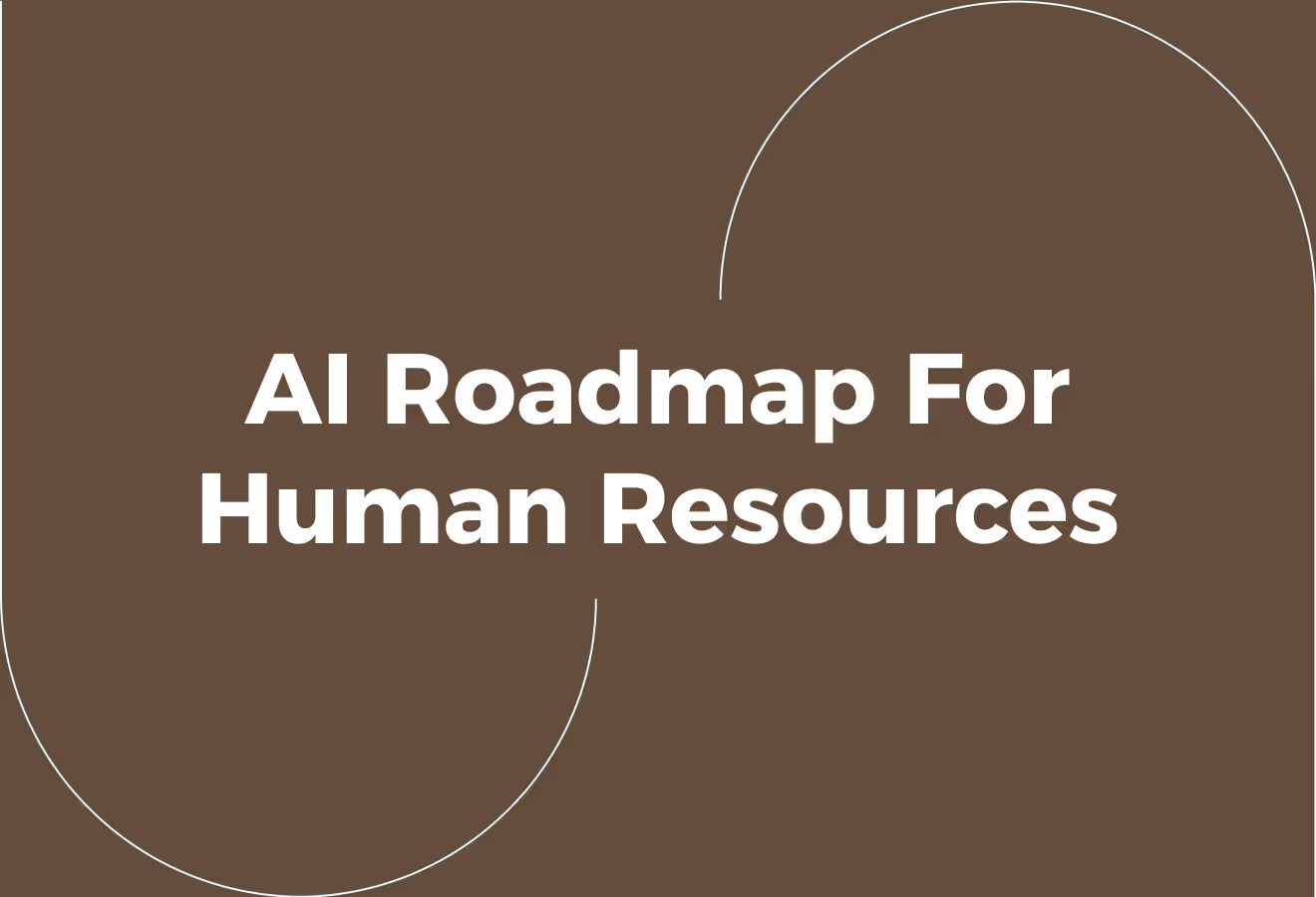
To successfully integrate AI into HR operations, organisations must first establish the foundational elements for effective implementation. Some best practices include:
Define Your AI Goals
Establishing a clear AI vision begins with articulating how the technology will support an organisation’s HR and business objectives. HR leaders should define specific, measurable goals that AI implementation will achieve, such as reducing time-to-hire by a certain percentage, improving employee satisfaction scores, or increasing retention rates.
This vision should identify priority areas where AI can deliver the best impact. A well-defined vision serves as a North Star for decision-making throughout the AI adoption journey, ensuring initiatives contribute to meaningful outcomes rather than pursuing technology for its own sake.
Establish Data Readiness
Data readiness is the foundation of a successful AI implementation. It may require organisations to audit their current HR data landscape to identify gaps, inconsistencies, or quality issues. Organisations must establish robust data governance practices to ensure accurate and accessible information across all systems.
This includes standardising datasets, cleaning records, and ensuring information sources are free of bias. Through this process, organisations should also define specific policies and procedures for data collection, ownership, storage, processing, and use.
Ensuring Data Privacy and Unifying Data Sources
Furthermore, organisations should evaluate their collection practices to ensure they capture the necessary information while respecting data privacy regulations. Ideally, during an AI transformation, an HR department seeks to break down as many data silos as possible, creating unified data sources AI can effectively utilise. Without proper data readiness, even sophisticated AI systems will produce unreliable results.
Improve Technology Infrastructure
A robust technology infrastructure must support AI applications effectively and securely. HR departments should evaluate their current system architecture to determine its capacity for AI integration, including processing power, storage capabilities, and security. During this process, an organisation typically audits existing human resources information systems (HRIS) to identify potential AI integrations or redundancies.
An organisation’s tech infrastructure should also be secure. Encryption, access controls, and auditing capabilities help protect sensitive employee data. Additionally, integrations or APIs must be identified to connect AI tools with existing HR systems, ensuring seamless data flow and user experience. Technology infrastructure planning should also consider scalability requirements as AI expands through the organisation.
Upskill HR Teams
Preparing HR professionals for AI collaboration requires upskilling programmes addressing both technical competencies and strategic thinking capabilities. HR team members need training on AI fundamentals, including how various technologies work and their respective applications. Data literacy will become even more essential in the years to come. HR professionals should understand how to query AI tools and interpret AI-generated insights.
Change management skills are key to a successful AI adoption. These skills help HR teams guide organisation-wide transformation as AI reshapes workflows and employee experiences. Professional development should also include emerging best practices in AI governance, ethics, and compliance to ensure responsible implementation.
Focus on Change Management and Culture
Successful AI adoption requires cultural transformation that embraces technology as an enabler rather than a threat. As the IBM Institute for Business Value recently found, 57% of CEOs believe culture change is more important than overcoming technical challenges during a data-driven transformation.
Leading Through AI-Driven Change
HR leaders must clearly communicate the vision for human-AI collaboration, emphasizing how automation will free staff to focus on higher-value activities. A culture of continuous learning and experimentation should be fostered, encouraging HR professionals to explore AI capabilities and share their insights.
Leadership teams should model openness to AI-driven changes and demonstrate a commitment to supporting employees through the transition. By carefully managing this process, HR leaders can achieve organisation-wide buy-in and foster a sense of momentum among their workforces.
Embrace Pilot Projects Before Scaling
Strategic pilot projects enable organisations to test AI capabilities in controlled environments, building internal expertise and confidence. Initial pilots should focus on well-defined use cases with clear success metrics and manageable scopes. Additionally, pilots should generally include evaluation criteria measuring both quantitative outcomes and qualitative user experiences. Lessons learned from pilots can be applied to subsequent implementations, creating an iterative improvement process that drives ongoing enhancements.
Balancing Growth with Quality in AI Adoption
Scaling strategies should be developed concurrently, taking into consideration the timeline and the level of organisational readiness. Successful scaling requires balancing ambitious growth with careful attention to quality control, along with sustainable change management processes. The most successful HR transformations identify the most valuable initiatives and scale them accordingly throughout an organisation.
Book a demo to speak with Our Team about Our Global HR System
Cercli’s platform is built for organisations in the Middle East to manage their entire workforce, whether local or spread across 150+ countries, from a single platform. The platform helps businesses run compliant payroll across the UAE, Saudi Arabia, and the wider MENA region.
This includes managing leave, onboarding employees, tracking assets, and handling global contractor payments in multiple currencies. Whether you’re working with 25 employees or scaling to 500+ across various markets, Cercli combines strong local expertise with international capabilities. The platform provides your HR team with a single, compliant system to manage operations and pay your workforce globally.
Related Reading










